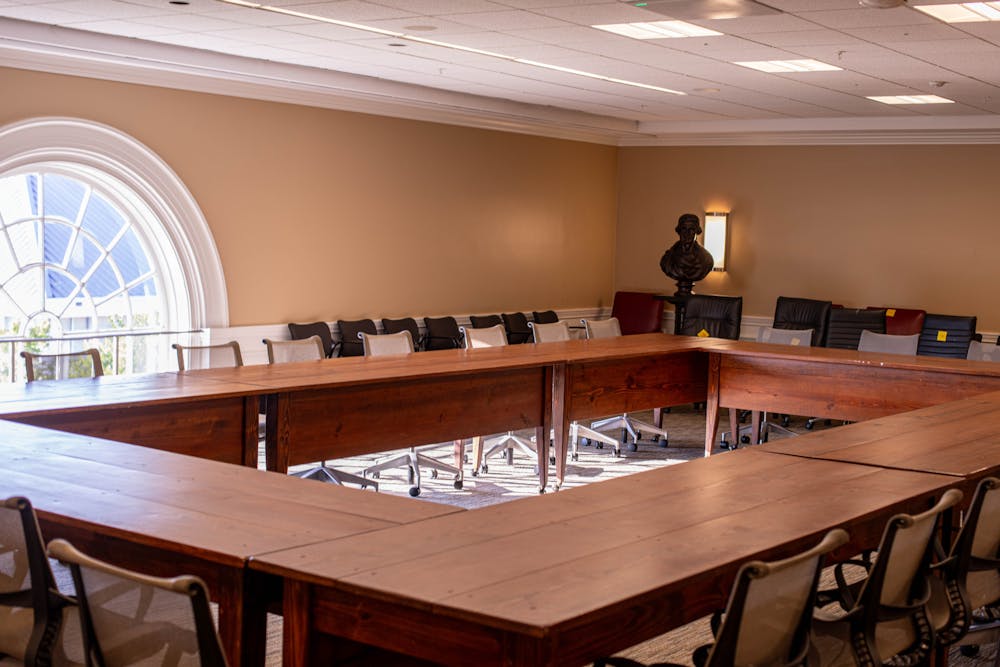The Honor Committee met Sunday over Zoom and passed new bylaws that outline its first formal procedure for determining if students fail to comply with sanction from the Committee. According to the new bylaw, the Committee will employ a trial system to determine if a guilty student has or has not acted in accordance with their sanctions. According to a policy proposal presented by the Policies and Procedures Subcommittee, the change was prompted due to recent cases of noncompliance among several accused students.
During the July 2023 transition to a multi-sanction system, the Committee transformed its former single sanction approach — which required either expulsion or a two-semester leave of absence for all students found guilty of committing an Honor infraction — into a multi-sanction system. This adjustment expanded the set of available sanctions for accused students, where sanctions now range from rehabilitative seminars to more punitive sanctions like suspension.
Noncompliance occurs when a sanctioned student fails to adhere to one or more of the newly implemented sanctions that comprise the multi-sanction system. The consequence for guilty students found to be noncompliant with their assigned sanctions is expulsion.
Before Sunday’s bylaw change, when a student was referred to the Committee for noncompliance, the executive committee would conduct a vote to determine whether a student complied with their assigned sanctions. The new formalized process is instead structurally modeled after the Committee’s hearing for guilt, the trial system used by the Committee to determine if an accused student committed an infraction.
Similar to a hearing for guilt, a student referred for noncompliance will now receive representation provided by an Honor Counsel — a member of the Committee who is tasked with defending accused students. During the proceedings of the noncompliance hearing, both the accused party and the Committee will have the opportunity to present opening statements and cross-examine witnesses related to the accusation.
The Hearing Chair will oversee this new adjudication process, ensuring adherence to procedural rules and addressing any objections raised by Counsel. Finally, after all evidence has been presented and deliberations have concluded, the executive committee will vote on whether the student is noncompliant with their sanctions, applying the "Beyond a Reasonable Doubt" standard.
The Policies and Procedures Subcommittee — led by third-year College Rep. Mary Holland Mason and third-year College Rep. Margaret Zirwas — is responsible for advising the Committee on procedures and written bylaws, including those pertaining to noncompliance. At Sunday’s meeting, Mason presented the subcommittee's procedure proposal to the Committee, which outlined the new noncompliance process.
According to the proposal, the new system provides a formal process for students to defend themselves against accusations of noncompliance, reinforcing their rights and enabling the Committee to make a fair determination. When a student accused of noncompliance is referred to the executive committee, they will now be provided with counsel by a Committee member and undergo a structured proceeding with formal trial processes and a focus on evidence, rather than simply receiving a more informal hearing.
“Currently … the blanket sanction for someone deemed non compliant is expulsion,” Mason said. “I think there's a need to formalize a lot of the procedures in order to determine non compliance just for consistency and transparency sake.”
The hearings for guilt and the process for adjudicating accusations of noncompliance do have some notable differences. First, unlike the hearing for guilt process which has restrictions on when and how evidence can be submitted, the noncompliance hearing will have no limitations. Further, instead of the reporter of the offense acting as the primary witness for the community like in a hearing for guilt, the vice chair for sanctions will assume this role in a noncompliance hearing.
The noncompliance procedure also limits whom parties can call as witness, barring the Chair and members of the executive committee, with the exception of the vice chair for sanctions, from testifying. According to the proposal, this stipulation ensures that the executive committee — which votes to determine whether a student failed to comply with the sanctions assigned to them — are not directly involved in the case which they are adjudicating.
The Committee achieved quorum and voted in favor of adopting the new noncompliance procedure. Additionally, the Committee reviewed upcoming initiatives concerning support officer recruitment and the fall 2024 new student orientation, where the Committee will inform incoming students about the Honor system. These matters, along with case-processing changes and general updates from other subcommittees, will be further discussed during the Committee's next meeting scheduled for August.







